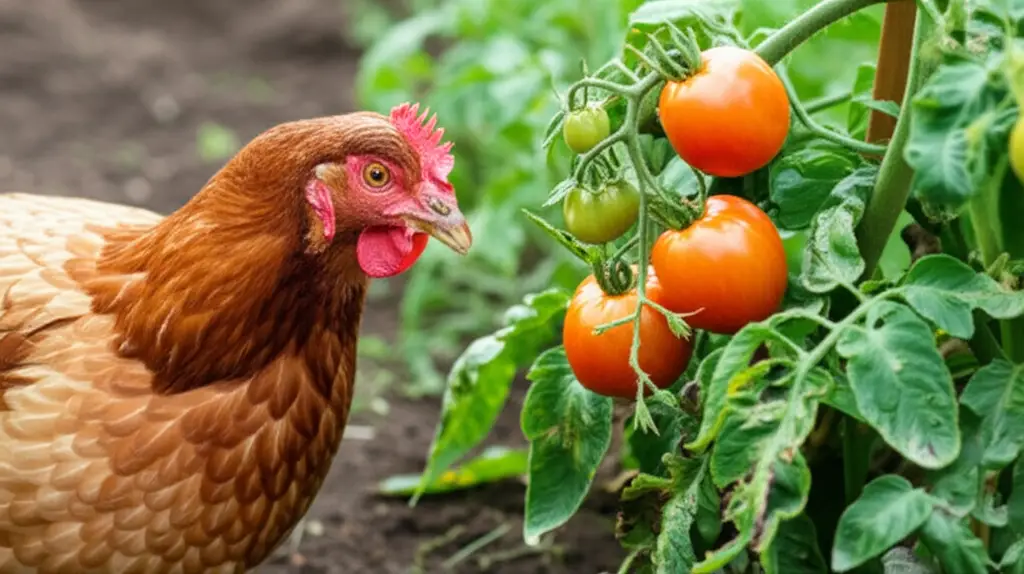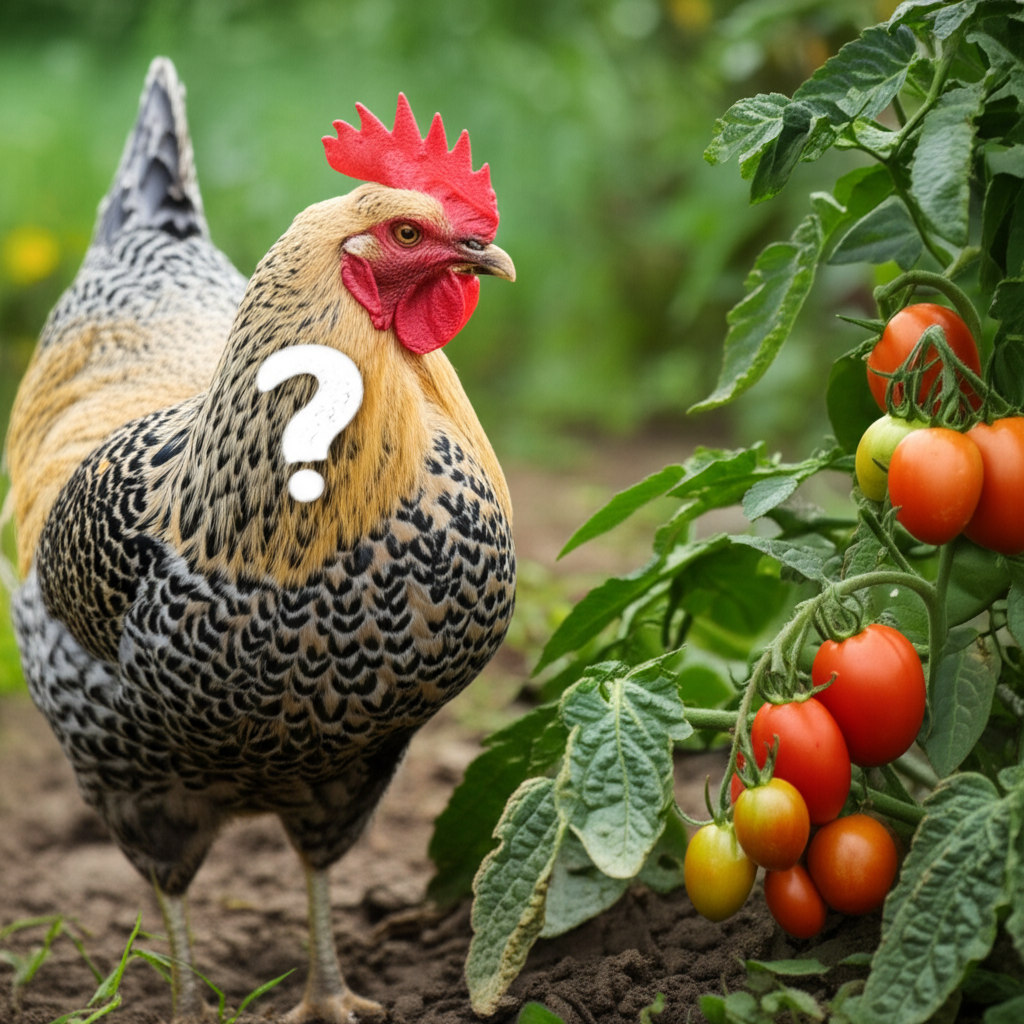Can chickens eat tomato plants? This is a common question among backyard chicken keepers, especially those who also enjoy gardening. While the juicy red fruits of the tomato plant are a healthy treat for our feathered friends, the rest of the plant presents a more nuanced situation. Understanding the potential risks and benefits will help you decide whether to allow your flock access to your tomato patch.
JUMP TO TOPIC
Are Tomato Plants Safe for Chickens? A Closer Look

The green parts of the tomato plant, including the stems, leaves, and unripe fruit, contain solanine and tomatine. These compounds belong to a family of chemicals called glycoalkaloids, which act as natural defenses against pests. While these compounds are present in lower concentrations in domesticated tomato varieties compared to their wild relatives, they can still pose a risk to chickens if consumed in large quantities.
The Potential Dangers of Solanine and Tomatine
Solanine and tomatine disrupt cell membranes, affecting the nervous and digestive systems. In chickens, symptoms of glycoalkaloid poisoning can include:
Lethargy and weakness: Affected chickens may appear drowsy and reluctant to move.
Loss of appetite: A decrease in food intake is a common early sign.
Diarrhea and vomiting: Digestive upset can lead to dehydration.
Tremors and paralysis: In severe cases, neurological symptoms may develop.
Dilated pupils: This is a less common, but possible, symptom.
Death: While rare, death can occur in cases of severe poisoning, particularly in smaller birds or if a very large quantity of tomato plant material is ingested.
How Much is Too Much? Determining a Safe Level
The exact amount of tomato plant material that can cause toxicity in chickens is difficult to determine. It depends on various factors, including the chicken’s size, age, overall health, and the specific variety of tomato plant. Some heirloom varieties contain higher concentrations of glycoalkaloids than modern hybrids. It’s also crucial to consider that individual chickens may have different sensitivities. As such, it’s always best to err on the side of caution.
Can Chickens Eat Tomatoes? The Fruit vs. the Foliage
While the green parts of the tomato plant contain solanine and tomatine, the ripe red fruit itself is generally safe for chickens to eat. In fact, ripe tomatoes are a good source of vitamins A and C, as well as antioxidants like lycopene. These nutrients can contribute to a healthy immune system and overall well-being in your flock. However, moderation is key. Too many tomatoes can lead to digestive upset, just like any other treat. Offer them sparingly as part of a balanced diet.
Serving Tomatoes to Your Flock: Best Practices
Offer ripe, red tomatoes: Avoid giving chickens green tomatoes as they contain higher levels of solanine.
Chop or mash the tomatoes: This makes them easier for chickens to eat and digest.
Don’t overdo it: Tomatoes should be a treat, not a staple food. Offer them in moderation.
Observe your chickens: After introducing tomatoes, monitor your flock for any signs of digestive upset or other unusual behavior.
Weighing the Risks: Tomato Plants in the Chicken Run
Given the potential toxicity of tomato plants, it’s generally recommended to keep them out of reach of your chickens. While a small nibble here and there is unlikely to cause serious harm, consistent access to the plants can lead to excessive consumption and increase the risk of poisoning.
Alternatives to Tomato Plants for Chicken Foraging
If you want to provide your chickens with healthy foraging opportunities, there are many safe and nutritious alternatives to tomato plants. Consider planting these chicken-friendly options:
Leafy greens: Lettuce, kale, spinach, and chard are excellent sources of vitamins and minerals.
Herbs: Basil, oregano, parsley, and mint can provide flavor and potential health benefits.
Root vegetables: Carrots, beets, and sweet potatoes are packed with nutrients.
Fruits: Berries, melons, and apples (without the seeds) are healthy and delicious treats.
Accidental Ingestion: What to Do if Your Chicken Eats Tomato Leaves
If you suspect your chicken has ingested a significant amount of tomato plant material, contact your veterinarian immediately. Early intervention is crucial in cases of potential poisoning. Describe the symptoms your chicken is exhibiting and estimate the amount of plant material consumed. Your veterinarian may induce vomiting or administer activated charcoal to help absorb the toxins.
Preventing Tomato Plant Consumption: Practical Tips
Fencing: Use fencing to create a barrier between your tomato garden and your chicken run.
Elevated planters: Growing tomatoes in raised beds or hanging baskets can keep them out of reach.
Supervision: If you allow your chickens free-range access to your garden, supervise them closely to prevent them from pecking at your tomato plants.
Distraction: Provide your chickens with alternative foraging opportunities, such as a dedicated compost pile or a designated area with safe plants and scratch.
The Verdict: Tomatoes for Chickens – Yes or No?
The question of whether chickens can eat tomato plants isn’t a simple yes or no. While the ripe fruit itself offers some nutritional benefits, the leaves, stems, and unripe fruit contain toxins that can be harmful to chickens. To minimize the risk of poisoning, it’s best to keep tomato plants out of your chickens’ reach and offer ripe tomatoes only as an occasional treat. By understanding the potential risks and benefits, you can make informed decisions to ensure the health and well-being of your flock. Prioritizing a safe environment and a balanced diet will help your chickens thrive.

